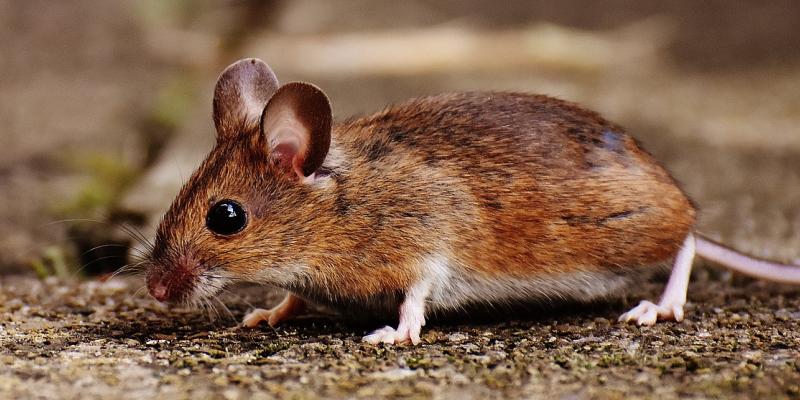 Last Updated: 5/05/2021
Last Updated: 5/05/2021
Estimated Reading Time: 4 minutes
What is a Field Mouse?
The common field mouse (mus musculus), also known as the long-tailed field mouse, brown mouse, wood mouse, or meadow mouse, is aptly named, as it can generally be found in burrows in grasslands, fields, wooded areas, and gardens. An adult field mouse is around 4 inches in length and can be identified by its:
- Large eyes and ears
- Sandy or reddish-brown fur
- Dark brown tail
- White or gray underbelly
What Do Field Mice Eat?
The common field mouse eats fruits, berries, and nuts, as well as small insects such as beetles, snails, and grasshoppers. Additionally, these brown mice will also eat various plants, bark, grass, and underground fungus.
Are Field Mice and Voles the Same Thing?
While they sometimes get mixed up, voles and field mice are not the same animals, though they resemble each other in size and coloring. Compared to field mice, voles have smaller eyes and ears, stouter bodies, shorter tails (often with more hair), and lack the lighter underbelly fur.
Are Field Mice Dangerous?
While field mice generally do not bite and are not aggressive, they pose other dangers, as they can commonly transmit diseases such as Hantavirus, Salmonella, and Lymphocytic Choriomeningitis (LCMV). Aside from direct contact, these small rodents can also infect humans through their droppings, urine, or saliva. Mice can also carry ticks, fleas, and mites, which can transmit Lyme disease, Plague, and Colorado Tick Fever.
How to Get Rid of Field Mice
If you noticed gnawed on leaves or trees, small, dark brown droppings the size of a rice grain, or piles of dirt that look like the entrance to a burrow—you may have a field mouse infestation.
- Maintain a clean yard: This includes regularly mowing your grass, pulling tall weeds, and removing any leaf or brush piles. If you have a compost pile, we recommend keeping it in a sealed container and moving it away from your house and any outdoor buildings, as all of these locations are potential nesting sites. Additionally, power raking your grass can help to remove thatch, which makes your lawn less attractive to field mice.
- Remove or modify food sources: Field mice are drawn to habitats that offer easily accessible food sources, such as bird food, pet food, or trash. Keep any uneaten pet food or birdseed in a sealed container inside your home and use a lid that locks to seal your trashcans.
- Cover openings to burrows: As mentioned, field mice build nests in burrows in the ground. To get rid of the small rodents, you can try to cover the entrance to a burrow with rocks or dirt to prevent the mice from entering or exiting. This is not a very effective method, as the openings are commonly dug up again.
- Eliminate entry points: While field mice generally live outside in burrows and tall grass, they sometimes enter homes in search of a safe, warm spot to spend the winter. To prevent mice from entering your home, examine the perimeter of your house and look for any holes or cracks through which mice and other pests may enter. If you find any holes, stuff them with steel wool or copper mesh and apply caulk or foam to hold them in place. Additionally, check for cracks around doors and windows and consider investing in door sweeps and weather-stripping.
- Use traps and toxicants: If you are dealing with a field mouse infestation, consider strategically placing baited snap traps near the rodents’ nest. Remember that mice like to stay close to the shelter, meaning that they run close to walls, underneath thick bushes and shrubs, and do not travel more than 5ft into an exposed area. When using traps and toxicants, be careful to keep them away from children and pets.
- Talk to a professional: The best way to permanently keep field mice out of your lawn is by reaching out to a professional lawn service, such as Blades of Green.
BOG is a family-owned lawn care and pest control company with over 30 years of experience. Our team of expert technicians takes care of mice in Maryland and Virginia and provides an initial inspection of your property, an intensive interior and exterior treatment program, and follow-up services, as well as tips and tricks on how to prevent further pest problems.
Have a Question About Lawn Care? Ask the Experts!
Having a lawn care problem that you can’t seem to solve? Send your question to our expert technicians and get the answers you need to get a healthy, beautiful lawn.
Ask a Lawn Care QuestionConsider Professional Lawn Care
End the guesswork and stress of lawn maintenance. Let our experienced team put their expertise to work making your lawn healthy and beautiful.
Get a FREE Lawn Care Quote Now
Quick Quote Form
"*" indicates required fields
